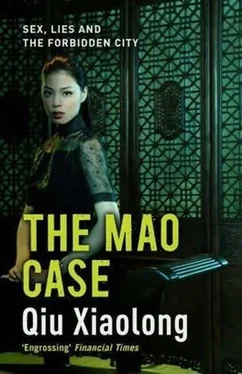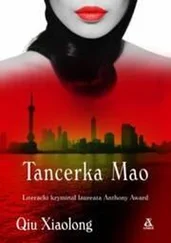After wind and rain seeing off the spring, / flying snow comes as a harbinger of the spring. / On the ice covered cliff, / the plum blossom still shines. / Pretty, she does not claim the spring for herself, / content to be a herald of spring. / When hills are ablaze with wildflowers, / in their midst she smiles.
“It was written in December 1961, after a poem by Lu You, a Song-dynasty poet,” Long said. “It’s also a poetic convention, you know, to write in response or correspondence to another poem. In both poems, the plum blossom symbolizes an unyielding spirit, but in each, from a different perspective.”
“Yes, I think you’re right.” Chen turned a page and read Lu’s poem as an appendix.
Outside the post house, beside the broken bridge / a lone plum blossom stands deserted, / against the worries of the solitary dusk, / against the wind and rain. / Not anxious to claim spring for herself, / she endures the envy of other flowers. / Her petals fallen, in dust, in mud, / in spite of a remaining fragrance.
“Like other poems, ‘Ode to the Plum Blossom’ was commonly read as one full of Mao’s revolutionary spirits,” Long said, stirring the sauce in the crab shell with a toothpick. “That interpretation is taken for granted. According to an article I read, someone who had worked with Mao wrote him a letter, quoting Lu’s poem to express admiration, and Mao wrote his ode in response. But mind you, Lu’s poem has nothing to do with admiration. If anything, it is full of complaint and self-pity. A patriotic poet, Lu wanted to serve his country by fighting against the Jin army, but he wasn’t able to, serving instead as merely a petty official. Again, it’s conventional in our traditional poetics to compare someone disappointed to a deserted beauty or neglected blossom, so the meaning of the poem is unmistakable.”
“I think you are brilliantly perceptive here,” Chen said, poking the meat out of a crab leg with a chopstick.
“So who could have sent that poem to Mao? A reasonable guess would be a woman with an unusual relationship with Mao. Only in that circumstance would such a gesture have made sense. She knew that Mao had other women, but she knew better than to complain to his face. So Mao’s poem in response was one of approval of her stance. From his perspective, it’s nothing but natural that an emperor should have three hundred and sixty imperial concubines. In spite of knowing about the other flowers competing for spring’s attention, she should be content as one favored by him earlier, smiling in the midst of all the flowers over the mountains.”
“Why did those official critics cover up the real occasion of the poem? I think the answer is self-evident,” Chen said, hardly able to conceal the excitement in his voice. “Yes, Shang’s perhaps the only one with enough education to quote a poem like that to Mao. Those working around him were mostly young, little-educated, working-class girls.”
Long bent over the crab shell, draining the sauce in it in silence. “Also, about that scroll of the poem in Mao’s calligraphy,” Chen said. “Did Shang’s colleague tell you anything else? For instance, when Mao wrote a poem to someone else, he would usually add a short line as a dedication, and a red chop seal as an indication of its authenticity. Did her colleague see anything like that on the scroll?”
“No, he didn’t see clearly – just a glimpse of it. It was in her bedroom, you know. But he was sure it wasn’t a photocopy, which wasn’t available at the time.”
“If possible, I would like to meet with that colleague of Shang’s. It could be crucial to establish the identity of the person Mao wrote the poem for. Of course, we don’t have to get into explicit details in our book.”
“I’m not sure if he’s still in town. I contacted him several years ago, But I’ll try.”
“That would be fantastic. Let’s toast to our collaboration -”
The door opened unexpectedly, however, before either of them heard the turning of the key in the lock.
Long’s wife returned, a short woman with gray hair and black-rimmed glasses, who frowned at the sight of the litter on the table.
“Oh, this is Chief Inspector Chen of the Shanghai Police Bureau, also a leading member of the Shanghai Writers’ Association.” Long introduced him in a sudden stutter suggestive of a henpecked husband. “He brought a whole bamboo basket of crabs. I have kept some for you.”
It was out of the question for them to continue talking about Mao in her presence.
“Oh, you shouldn’t have drunk so much,” she said to Long, pointing at the empty Shaoxing yellow rice wine bottle standing like an inverted exclamation mark on the table. “You are forgetting about your high blood pressure.”
“Chief Inspector Chen and I are working together on a new translation of Mao’s poetry to be published here as well as abroad. So I won’t have to worry about my ‘professional writer’ status anymore.”
“Really!” she said incredulously. “This calls for a celebration. Oh, we will have crabs just like before.”
“I’m sorry, Mrs. Long. I didn’t know about his high blood pressure, but he is giving me so much help on this book project,” Chen said, rising. “I have to leave now. Next time, I promise we will have nothing but crabs, not a single drop.”
“It’s not your fault, Chief Inspector Chen. I’m glad you have not forgotten him.” She turned to her husband and said in a low voice, “Go and look at your face in the mirror. It’s as red as Mao’s Little Red Book.”
“Look at the table,” Long said a little blurredly, accompanying Chen to the door, “It looks like a battle field deserted by the nationalist troops in 1949. Remember the poem about the liberation of Nanjing?”
Looking back, Chen found the littered table looked somewhat like a deserted battlefield, with broken legs, crushed shells, scarlet and golden ovaries scattered here and there, but he failed to recall the image from that particular poem by Mao.
DETECTIVE YU DECIDED TO interview Peng, Qian’s second lover.
Yu didn’t know the neighborhood officer in charge of Peng’s area that well, so he had to approach Peng by himself, without telling anybody or revealing that he was a cop. It was a necessary move after an encounter Old Hunter had unexpectedly witnessed between Jiao and Peng – a suspicious meeting in a grocery store, where Jiao gave money to Peng.
What was going on between the two?
Peng’s affair with Qian had lasted no more than half a year before he was thrown into jail. When released, he could hardly take care of himself, let alone Jiao. They didn’t have any contact for all those years. She wasn’t his daughter, or even a stepdaughter.
As Old Hunter considered himself more experienced at shadowing a person, he wanted to focus on Jiao. So it was up to Yu to tackle Peng.
Early in the morning, Yu arrived at the market where Peng worked as a pork porter but was told that he had been fired.
“A good-for-nothing guy, capable of soft-rice-eating only,” an ex-coworker of Peng’s said, hacking at a frozen pig head on a stump, spitting on the ground littered with rotten cabbage leaves. “You’ll probably find him eating white rice at home.”
It was a harsh comment, particularly the “soft-rice-eating,” a phrase that usually referred to a parasitic man dependent on a woman. But, if in reference to Peng’s affair with Qian, it was not true. It had happened many years ago, when Qian had little money. As in a saying Old Hunter would quote, it’s easy to throw rocks at one already fallen to the bottom of a well. Yu thanked the ex-coworker, from whom he got Peng’s home address.
Following the directions, Yu changed buses twice before he found himself at a shabby lane near Santou Road.
Читать дальше












